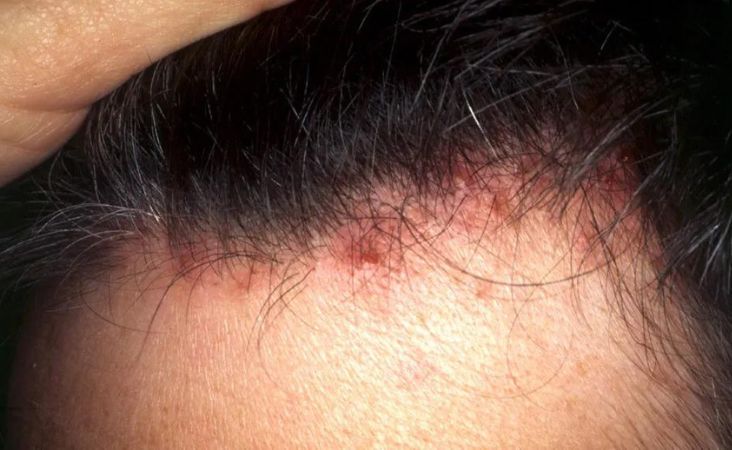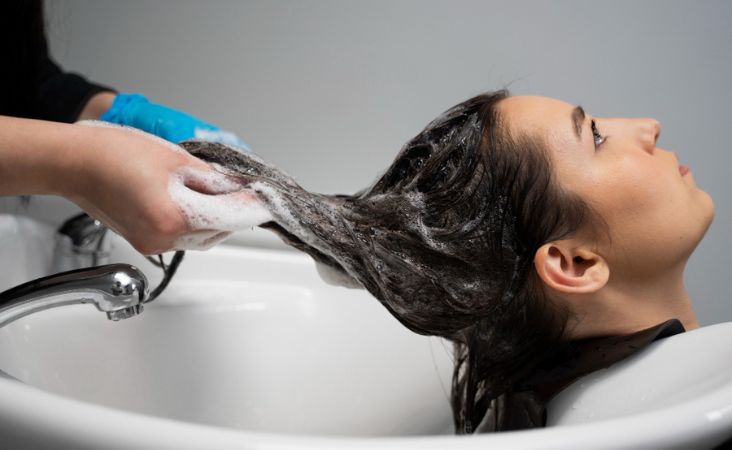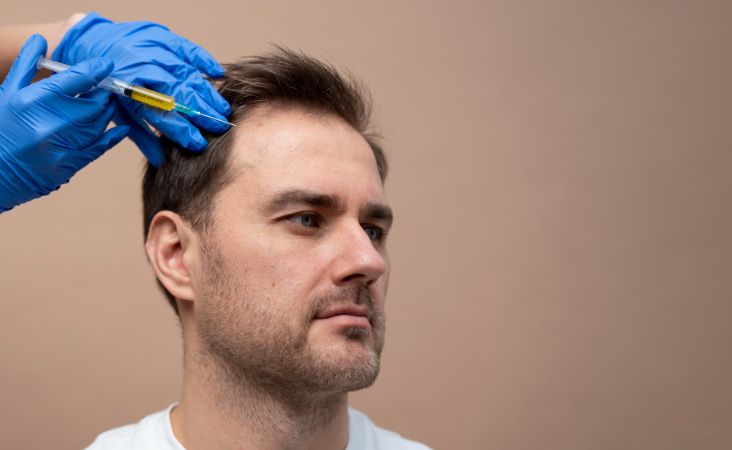Scalp Folliculitis Hair Loss: Connection, Causes, and Treatments
- Written by Vivek Khullar
- Mar 29, 2024
- |
- 14 min read
 Listen to the full text
Listen to the full textIf you have noticed pesky red bumps on your scalp, you are probably familiar with scalp folliculitis. While there are many rumors associated with scalp folliculitis, the most troubling is that it can lead to hair loss and thinning. But Is there any truth to this theory? Can those itchy bumps be stealing your precious strands?
Don't worry, we've got your back (and scalp). In this blog, Lordhair - trusted globally for hair wigs for men and women - will unravel the connection between scalp folliculitis and hair loss. We'll explore the culprits behind this double trouble and unveil the best weapons for your anti-hair-loss arsenal.
So, keep reading. You will certainly find great tips to eliminate those bumps and keep your hair looking its best! But first, let’s learn:
What is Scalp Folliculitis?
Imagine your scalp as a bustling metropolis, say New York City. Here, your hair follicles represent tiny apartment buildings. Each building houses a hair strand that constantly grows and renews itself. Now, picture trouble brewing in these follicle flats. Scalp folliculitis is like a miniature riot. It is a condition that throws the whole system into chaos.
Inflammation takes hold. It turns the once peaceful follicles into angry, red bumps. Some of these bumps are filled with pus or whiteheads, making the scalp feel itchy and tender. While the exact cause of this follicular fury remains a mystery, the good news is that with a little detective work, we can identify the culprit and restore peace in your scalp metropolis.
But hey, that’s something to discuss later. Right now, we should discuss what exactly causes scalp folliculitis!

What Causes Scalp Folliculitis?
Before we discuss the connection between scalp folliculitis and hair loss, we believe it’s important to learn what causes it. While the exact cause can vary, several factors can trigger this inflammatory uprising. Let's delve deeper and understand the main culprits behind this follicular fury:
Infection
This is a common cause of scalp folliculitis. Wondering what’s the most frequent culprit? According to dermatologists, it’s a bacteria called Staphylococcus aureus - a resident on our skin. It can sneak into damaged hair follicles through nicks, cuts, or abrasions caused by scratching or harsh hair removal techniques.
Once inside, they multiply, causing inflammation and the formation of red, pus-filled bumps. In some cases, fungal infections caused by Malassezia (a yeast naturally present on our scalp) can also trigger folliculitis.
Ingrown hair
Ever dealt with those stubborn red bumps after shaving your scalp? If yes, you've likely encountered ingrown hair - another major cause of scalp folliculitis. It occurs when shaved hair curls back and pierces the skin instead of growing outwards. This trapped hair irritates the follicle, leading to inflammation and the formation of red bumps, often with a visible strand of hair trapped within.
Friction and irritation
Some dermatologists also state that constant friction against your scalp can irritate hair follicles and make them vulnerable to this hair loss condition. This can be caused by:
Tight hairstyles: Ponytails, braids, or headbands worn too tight can put a strain on your hair follicles, increasing the risk of inflammation and folliculitis.
Frequent scratching: Itchy scalp conditions like eczema or dandruff can tempt you to scratch vigorously. Result? This causes damage to follicles and creates entry points for bacteria and fungi.
Harsh hair products: Shampoos, conditioners, or styling products containing harsh chemicals or heavy oils can clog hair follicles and irritate the scalp. Thus, causing folliculitis.
Weakened immune system
A compromised immune system has a hard time fighting off infections. This can make you more susceptible to bacterial or fungal infections that can trigger scalp folliculitis. Conditions like HIV/AIDS and diabetes and also long-term use of certain medications can weaken the immune system.
Certain medications
Some medications, particularly corticosteroids, sometimes bring the side effects of increasing the risk of folliculitis. Corticosteroids suppress the immune system, making it harder to fend off bacteria and fungi that can trigger scalp infections.
Occlusive conditions
Love spending time in hot tubs or pools? Good but do you know that most of the time, these have poorly maintained chlorine levels? They can expose your scalp to bacteria like Pseudomonas folliculitis. This bacteria thrives in warm, stagnant water and can easily infect hair follicles, causing a hot tub rash characterized by red, itchy bumps.
Make sure to check out these sources as well:
Connection between dry flaky scalp and hair loss explained
Here’s the answer to why am I balding
Learn everything about ingrown hair on scalp
Hydrate your hair for optimal scalp health
Ultimate guide to getting rid of scalp build-up
If you suspect you have scalp folliculitis, consulting a dermatologist is the best course of action. Now that you’re aware of the causes, it’s time to discuss the connection between this condition and hair loss.
Are you ready? Let’s go!
Is There a Connection Between Scalp Folliculitis and Hair Loss?
Okay, now that we've identified the sneaky suspects behind the scalp folliculitis mayhem, the big question remains, “Can those angry, red bumps be stealing your precious hair?” The answer is…*drum rolls*...it depends.
While not all cases of scalp folliculitis lead to hair loss, chronic or severe inflammation can definitely impact your hair growth. Here's why:
A healthy hair follicle goes through a specific growth cycle, constantly producing new hair strands. However, when inflammation from folliculitis disrupts this cycle, it can damage the follicle itself. In mild cases, hair loss might be temporary. Meaning, strands will grow back once the infection clears.
However, in severe or chronic cases, particularly folliculitis decalvans (a rare type), the inflammation can become so intense that it permanently scars the follicle. This scarring destroys the follicle's ability to produce new hair. It leads to permanent hair loss in those affected areas.
But according to dermatologists, most cases of scalp folliculitis are mild and temporary. With proper treatment, the inflammation can be controlled and hair growth can resume normally. So, while temporary thinning might occur during an active case, addressing the folliculitis promptly can prevent permanent hair loss.
What are Treatments for Scalp Follicultus Hair Loss?
Here's a closer look at the effective treatments commonly used to combat scalp folliculitis and prevent hair loss:
Antibacterial shampoos and lotions
These medicated cleansers are the frontline soldiers in the fight against bacterial scalp folliculitis. Wondering how they work? Well, they work by gently removing excess oil and dead skin cells that can clog hair follicles, creating a breeding ground for bacteria. These cleansers often contain one or more of the following key ingredients:
Benzoyl peroxide: This powerful antibacterial agent kills bacteria on the scalp. It prevents them from colonizing follicles and causing inflammation. It also helps reduce redness and promote healing.
Salicylic acid: This ingredient has both antibacterial and keratolytic properties. It works by killing bacteria while also exfoliating the scalp. In simple words, it removes dead skin cells that can clog follicles. This allows for better penetration of other medications and promotes a healthier scalp environment.
Coal tar: A traditional treatment for scalp conditions, coal tar has antifungal and antibacterial properties. Not only does it help in reducing inflammation but also itching and scaling associated with scalp folliculitis.
When using an antibacterial shampoo or lotion, make sure to follow the instructions carefully. These products can be used several times a week for a few weeks or months, depending on the severity of your condition.
Read more: Head and Shoulder Cause Hair Loss
Note: It's important to note that some people might experience temporary side effects like dryness or irritation when using these shampoos. If you experience any discomfort, consult your dermatologist for alternative options.

Topical antibiotics
If your scalp folliculitis is moderate or severe, it is wise to get a subscription for topical antibiotic creams or gels. These medications are applied directly to the affected areas. They target specific bacteria causing the infection.
Topical antibiotics can be applied twice a day for a period determined by your dermatologist, usually a few weeks. Although these medications are generally well-tolerated, some people might experience mild side effects like itching or burning at the application site. So, discuss the side effects with your doctor.
Oral antibiotics
In cases of widespread or severe scalp folliculitis that doesn't respond to topical treatments, dermatologists prescribe oral antibiotics. These medications work systemically. Meaning, they travel throughout your body to combat the bacterial infection at its source.
Oral antibiotics can be very effective in clearing widespread infections. However, it's important to take the entire course of medication as prescribed by your doctor. Yes, even if your symptoms improve quickly!
Stopping treatment early can lead to the development of antibiotic resistance. It's also important to be aware of potential side effects like nausea, diarrhea, or yeast infections.
Antifungal medications
Okay, we’ve talked about antibacterial shampoos and medications. There might be cases where your dermatologist suspects a fungal infection as the main reason behind your scalp folliculitis. If that’s the case, we suggest using antifungal shampoos or oral medications.
For those who don’t know, fungal folliculitis is often caused by Malassezia. It’s a yeast that is naturally present on our scalp. However, an overgrowth of this yeast can trigger inflammation and bumps.
Antifungal shampoos typically contain ingredients like ketoconazole or ciclopirox. These medications work by killing the fungus and preventing its growth. They are used several times a week for a few weeks or months, depending on the severity of your condition.
In some cases, your doctor might prescribe oral antifungal medications. These medications should be taken daily for a specific period determined by your dermatologist.
Corticosteroid creams or injections
How could we not tell you about this treatment for dealing with hair loss caused by scalp folliculitis? If severe inflammation is associated with your condition, it is recommended to try topical corticosteroid creams or injections for a short amount of time. Corticosteroids are powerful anti-inflammatory medications that can rapidly reduce swelling, redness, and itching associated with the condition.
Remember we mentioned opting for this treatment for a “short time?” That’s because corticosteroids don't address the underlying cause of the infection. They are typically used for short periods to manage inflammation while other treatments (like antibiotics or antifungals) target the root cause of the folliculitis.
Long-term use of corticosteroids can have potential side effects like thinning of the scalp skin. So, it's crucial to follow your dermatologist's instructions carefully!

Lifestyle changes
Addressing any underlying lifestyle triggers that contribute to scalp irritation and folliculitis is crucial for long-term success. Here are some key lifestyle adjustments you can consider:
Hair care habits: First thing that you should consider is to avoid tight hairstyles like braids or ponytails. Why, you ask? Because these put a strain on hair follicles. Opt for looser styles and avoid dying your hair as they harsh chemicals.
Friction and irritation: Minimize scratching and rubbing your scalp which can worsen inflammation and introduce bacteria. Avoid wearing hats or helmets for extended periods, especially if they cause sweating.
Dietary considerations: While no specific diet directly cures folliculitis, some research suggests a link between high-glycemic foods and increased inflammation. Consider limiting sugary drinks and processed foods. Instead, incorporate more fruits, vegetables, and whole grains into your diet.
Remember, consistency is key. By implementing these lifestyle changes alongside your prescribed treatment plan, you can create a more favorable environment for healthy hair growth.
7 Low-level laser therapy (LLLT)
One of the best treatments for fixing hair loss caused by hair folliculitis! As the name itself suggests, LLLT uses low-level lasers to promote hair growth and healing in affected follicles. While more research is needed to solidify its effectiveness, this treatment shows promise as a complementary therapy for some cases.
LLLT involves directing low-energy laser beams at the scalp during in-office treatments or with at-home devices. The laser light is believed to stimulate blood circulation, reduce inflammation, and promote hair growth in follicles.
8 Hair systems
In some cases of hair folliculitis, it has been noted that hair loss and thinning escalates to an advanced degree and reversal rarely happens. While the red bumps are eventually checked, hair damage remains there for a long time. For such cases, hair systems are greatly helpful.
Also called toupees and men’s hair pieces, Lordhair's hair systems are crafted with the finest materials - think top-notch base materials and high-quality human hair strands. This ensures a hyper-realistic look and comfortable wear. Whether you're undergoing treatment or simply dealing with hair loss due to scalp folliculitis, a toupee hair replacement system can be the perfect solution.
Our systems are also known to be durable and breathable. Plus, they're surprisingly pocket-friendly. So, why wait? Regain your confidence and embrace a fuller head of hair with Lordhair!
Check out how amazing Chris looks after buying a premium hair system from our website.
Scalp Folliculitis and Hair Loss: Final Words
There we go!
We've covered everything you need to know about scalp folliculitis and hair loss. Remember, early diagnosis and proper treatment are key to combating this condition and promoting healthy hair growth.
For those seeking extra confidence boost while undergoing treatment, Lordhair's hair systems are a fantastic option. Visit our website to explore our wide range of comfortable, natural-looking, and affordable women’s and men’s hair systems.
Don't let scalp folliculitis hold you back from experiencing the joy of full, healthy hair. Contact us if you have questions regarding our hair systems. We’ll answer them for you and help you achieve the beautiful hair you deserve!


